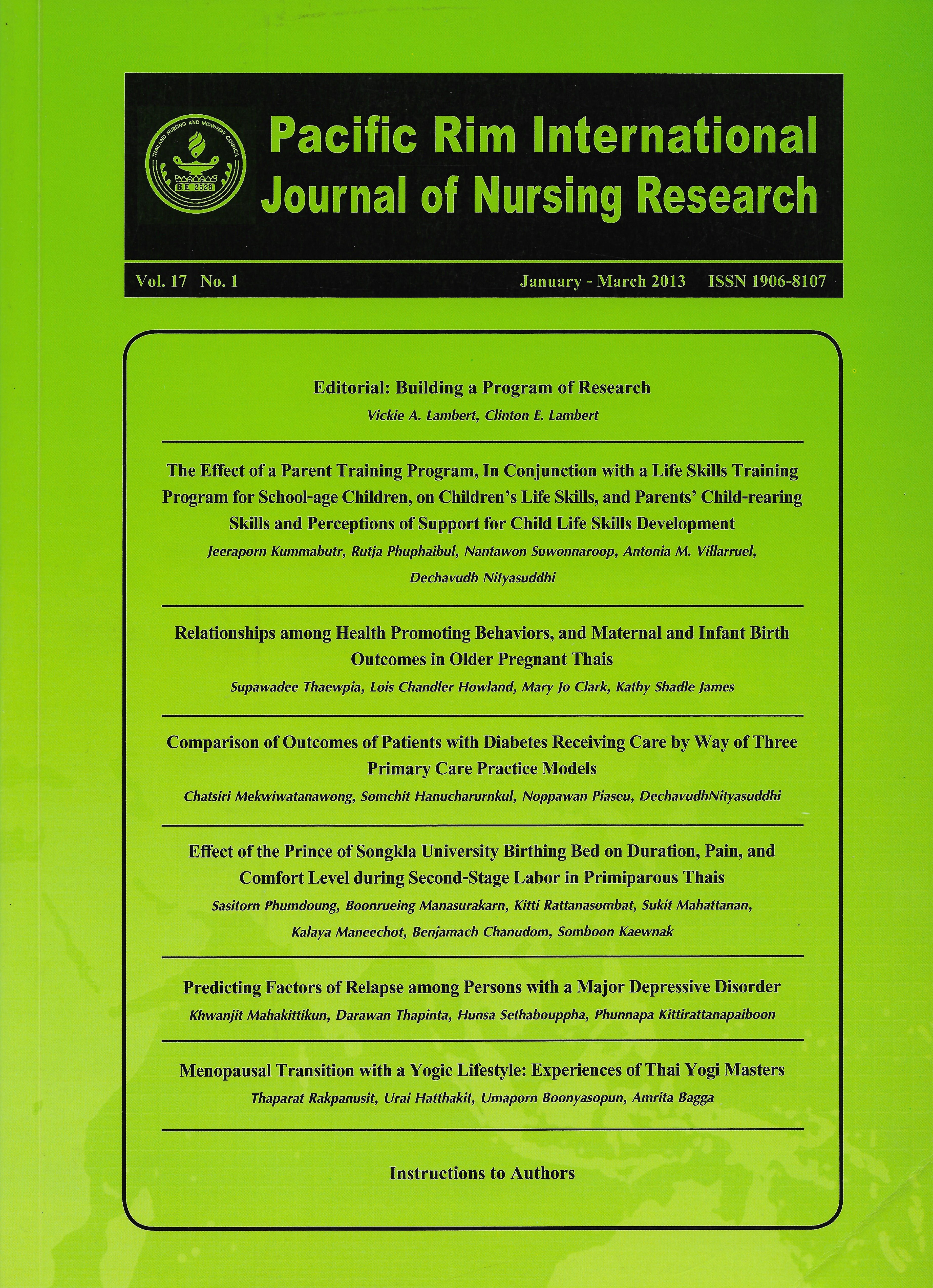Predicting Factors of Relapse among Persons with a Major Depressive Disorder
Keywords:
Major depressive disorder, Predictive factors, RelapseAbstract
Abstract : Major depressive disorder is the diagnosis used when an individual has chronic depression that may reoccur, whereby the affected person may experience a relapse of the illness. In order to prevent relapse of a major depressive disorder, it is essential to identify predictors of a potential relapse. Thus, this case-controlled study sought to examine psychosocial factors that might predict an impending relapse among persons with a major depressive disorder. Seventy-four individuals, diagnosed with a major depressive disorder, participated in the study. The data were analyzed via descriptive statistics and binary logistic regression.
The results revealed stressful life events, self-efficacy for coping with depression, and expressed emotion of family members as significant predictors of an impending relapse of a major depressive disorder. Together these three independent variables explained 52% (Cog and Snell R2) or 69.3% (Nagelkerke R2) of the variance of relapse among the subjects. Although the power of each independent variable in predicting the likelihood of a relapse of the illness was not high, the results support cognitive theory that hypothesizes stressful life events increase one’s likelihood of having a depressive relapse. The findings also support those of previous studies wherein self-efficacy for coping with depression and expressed emotion of family members have been found to be factors that may influence the relapse of a major depressive disorder.
บทคัดย่อ: โรคซึมเศร้าเป็นการวินิจฉัยที่ใช้เมื่อบุคคลมีอาการซึมเศร้าเรื้อรังที่ซึ่งอาจเกิดขึ้นซ้ำได้ โดยผู้ที่ได้รับผลกระทบนี้อาจมีประสบการณ์การกลับเป็นซ้ำของการเจ็บป่วยได้บ่อยครั้งขึ้น เพื่อ ป้องกันการกลับเป็นซ้ำของโรคนี้จึงมีความสำคัญที่ควรระบุถึงตัวทำนายการกลับเป็นซ้ำที่เป็นไปได้ การศึกษานี้เป็นการศึกษาย้อนหลังแบบที่มีกลุ่มควบคุมเพื่อตรวจสอบปัจจัยทางจิตสังคมที่น่าจะใช้ เพื่อทำนายการกลับเป็นซ้ำในผู้ที่เป็นโรคซึมเศร้า โดยมีผู้ที่ได้รับการวินิจฉัยว่าเป็นโรคซึมเศร้าเข้า ร่วมในการศึกษาจำนวน 74 ราย วิเคราะห์ข้อมูลโดยใช้สถิติ เชิงพรรณนาและสถิติถดถอยโลจิสติค
ผลการศึกษาพบว่าเหตุการณ์ที่ก่อให้เกิดความเครียดในชีวิต สมรรถนะแห่งตนในการจัดการ กับอาการซึมเศร้า และการแสดงออกทางอารมณ์ของสมาชิกครอบครัว เป็นตัวทำนายการกลับเป็นซ้ำของโรคซึมเศร้าที่สำคัญ ตัวแปรอิสระทั้ง 3 ตัวร่วมกันอธิบายความผันแปร ของการกลับเป็นซ้ำในผู้ที่ เป็นโรคซึมเศร้าได้ร้อยละ 52 (โดยวิธีของค็อกและสเนลล์ )หรือร้อยละ 69.3 (โดยวิธีของเนเกลเคิร์ก) แม้ว่าค่าอำนาจทำนายของตัวแปรอิสระแต่ละตัว ในการทำนายความเป็นไปได้ของการกลับเป็นซ้ำของการเจ็บป่วยไม่สูงมากนัก แต่ผลการศึกษานี้สนับสนุนทฤษฎีทางปัญญาที่มีสมมติฐานว่าเหตุการณ์ ที่ก่อให้เกิดความเครียดในชีวิตทำให้บุคคลมีโอกาสกลับเป็นซ้ำของโรคซึมเศร้าเพิ่มขึ้น ผลการศึกษา นี้สนับสนุนผลการศึกษาที่ผ่านมาอีกด้วยว่าสมรรถนะแห่งตนในการจัดการกับอาการซึมเศร้า และการ แสดงออกทางอารมณ์ ของสมาชิกครอบครัว เป็นปัจจัยสำคัญที่น่าจะมีอิทธิพลต่อการกลับเป็นซ้ำของ โรคซึมเศร้า
Downloads
How to Cite
Issue
Section
License
Copyright: The Pacific Rim International Journal of Nursing Research, Thailand Nursing & Midwifery Council has exclusive rights to publish, reproduce and distribute the manuscript and all contents therein.







.png)


